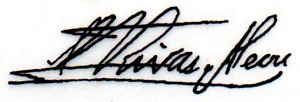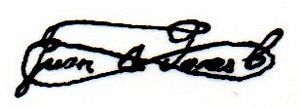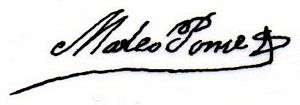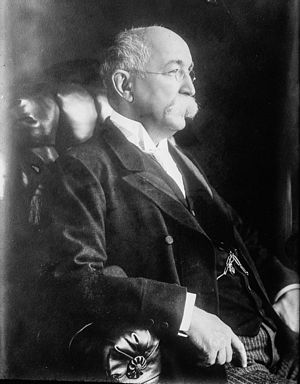Signatories on Banco Yucateco notes
Director
|
Manuel Pinelo Montero, a prominent businessman In Mérida, was the bank's first director. He signed the notes dated 1891 and 1892. Pinelo Montero resigned in July 1895 to be replaced by Enrique Muñoz AristeguiLa Semana Mercantil, 22 July 1895. He died in Mérida on 20 February 1902. |
 |
|
Casiano Castellanos Molina was born in Mérida in 1845. He signed the notes dated from 1897 to 1903. He died in Mérida on 19 December 1904. |
 |
Interventor
|
Pedro Rivas Peón Rivas Peón held various important public offices. He died on 12 February 1892 whilst still Interventor of the bankEl Correo Español, 26 February 1892; El Siglo Diez y Nueve, 29 February 1892. He signed the notes dated from 1891 to 1892. |
 |
|
M. Sánchez Tirado He signed the notes dated from 1897 to 1903. |
 |
Cajero
|
Filberto J. Méndez He signed the notes dated from 1891 and 1892. |
 |
|
Juan A. Pérez C. He signed the notes dated from 1897 to 1899. By 1917 Juan A. Pérez C. owned the valuable Sacdzudzil finca in TzucacabDiario Oficial, 30 January 1917. |
 |
|
Mateus Ponce Solís He signed the notes dated from 1900 to 1903. In January 1908 when Antonio Cáceres replaced Mateus Ponce it was discovered that Ponce had defrauded the bank of $740,000, from a strongbox that contained notes from Mexico City that had not yet been put into circulationEl Tiempo, México, 9 January 1908. Ponce had involved the Interventor, who had been silenced with a large loan. Ponce, the Interventor and various officials were arrested. Much of the money was recovered though Ponce has spent some on a lavish lifestyle, including a collection of rare exotic birdsEl Tiempo, 2 February 1908. Weirdly, in the few documents relating to the case in the state archive are receipts for the mozo who looked after Ponce's birds whilst he was on remand. $200,000 was recovered on 9 JanuaryEl Imparcial, Tomo XXIV, Núm. 4119, 10 January 1908 and $16,800 returned on 28 JanuaryEl Tiempo, 28 January 1908. Ponce’s defence was that he had been a honest and devoted employee but suffered from a family mental illness that caused him delusions of grandeurEl Imparcial, 23 January 1908: El Tiempo, 28 January 1908. He was convicted and sentenced to a monstrous twenty-seven years, two months and twenty days in prison. In April 1915 he appealed to the Constitutionalist governor Salvador Alvarado for release and a month later was set at libertyDiario Oficial, Año XVIII, Núm. 5377, 24 May 1915. |
 |
Other personages
|
At the end of 1907 Molina deployed all his forces to destroy the group headed by the Escalentes and gain total control of henequén production and the Ferrocarriles Unidos driving the Escalente companies into bankruptcy and accusing them of fraud. Molina was a federal deputy from 1869 to 1871 and 1873 to 1875, senator from Oaxaca for 1900 and 1902, and governor of Yucatán for two terms, from 1 February 1902 to 6 March 1907. As governor he is remembered for the number of schools he built, the paving and draining of Mérida's streets, and a spate of capital improvement projects in Mérida (O. Molina y Compañía received lucrative contracts for many of these capital projects.) He also reorganized the property registry, rewrote the state constitution, reformed the penal and civil codes, and reorganized the state National Guard and Mérida police force. In 1906 President Porfirio Díaz visited Mérida, and after marveling at all of the impressive physical changes, rewarded Molina by making him, in Match 1907, his Secretario de Fomento, Colonización e Industria. He fled to Havana in 1911 and died in exile on 28 April 1925. |

